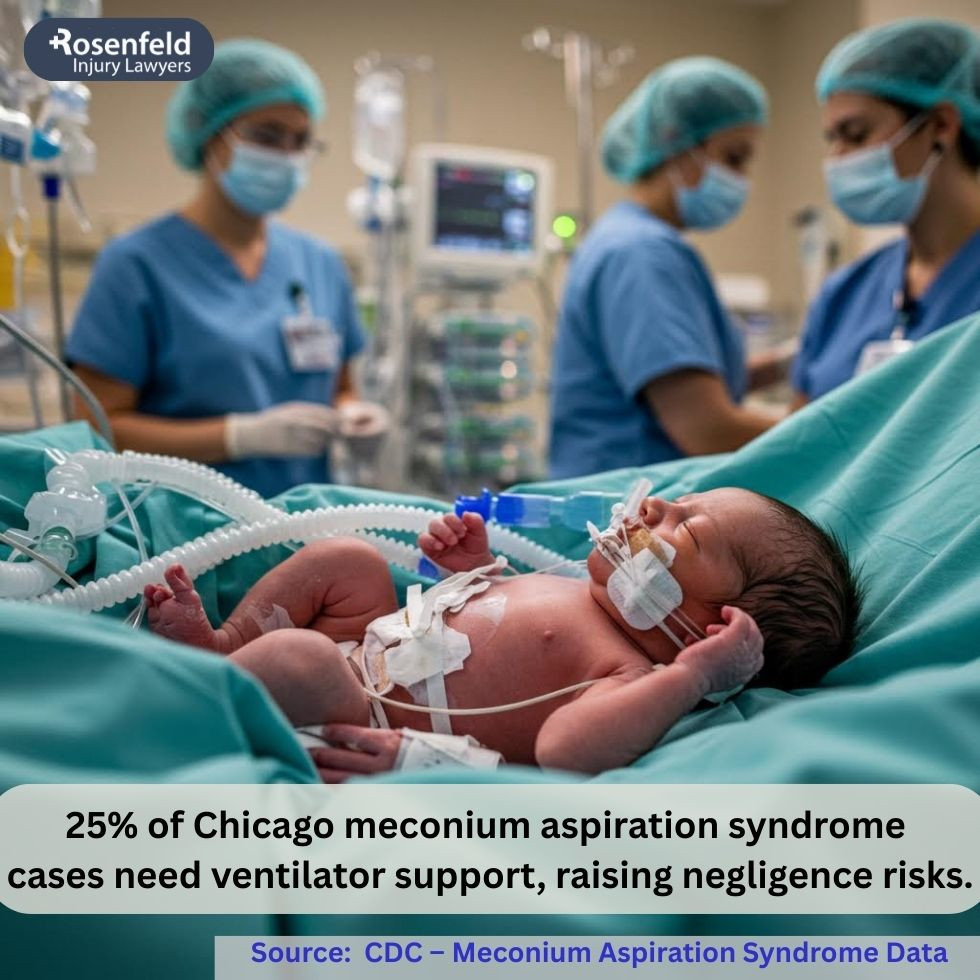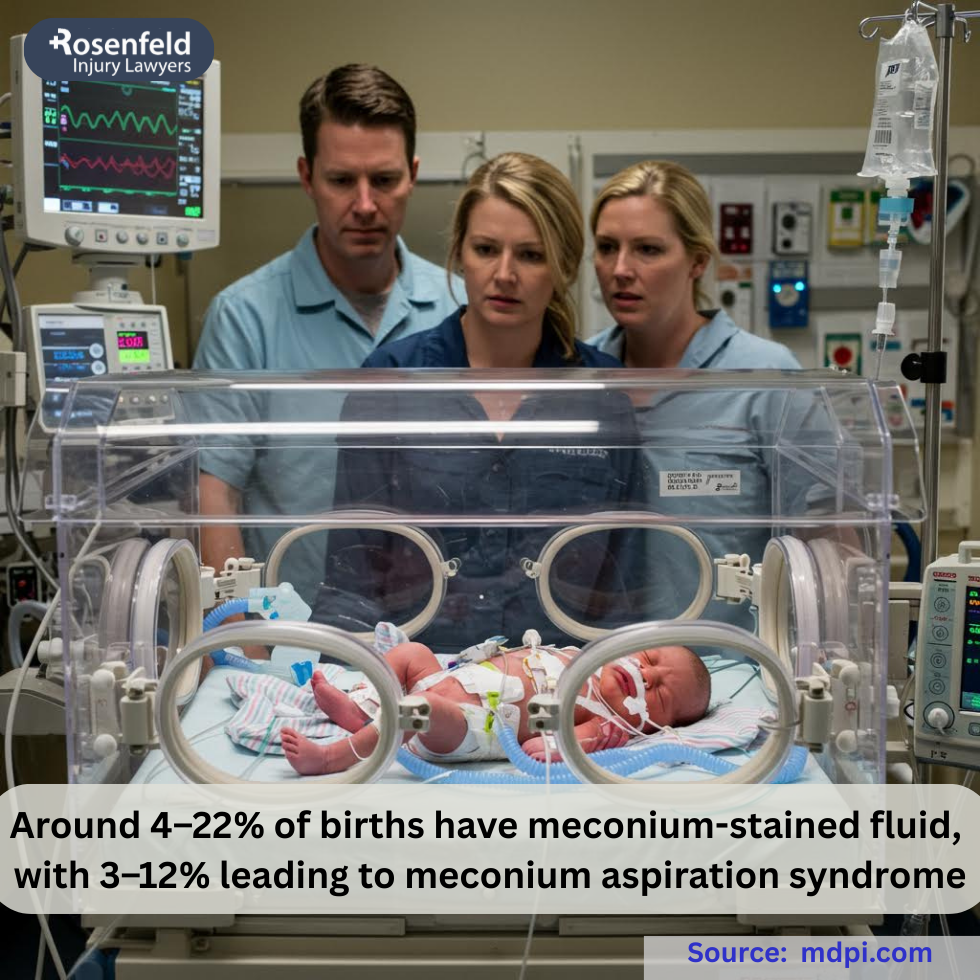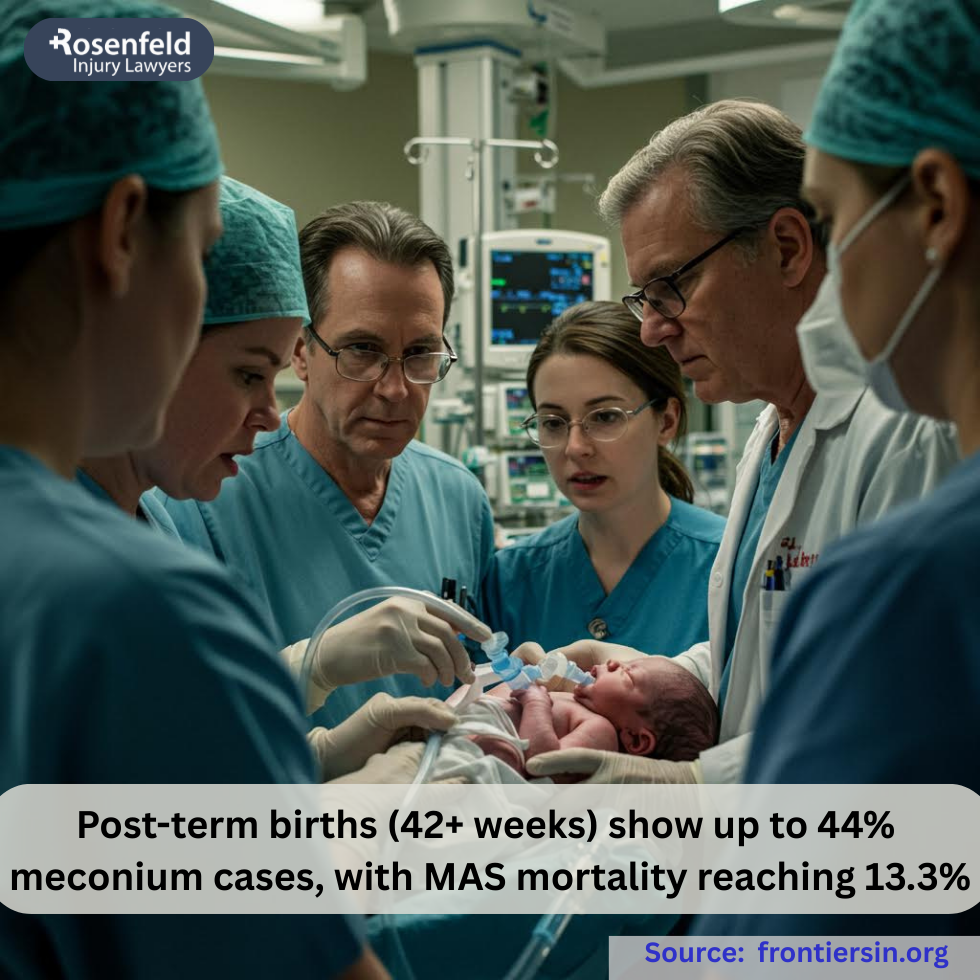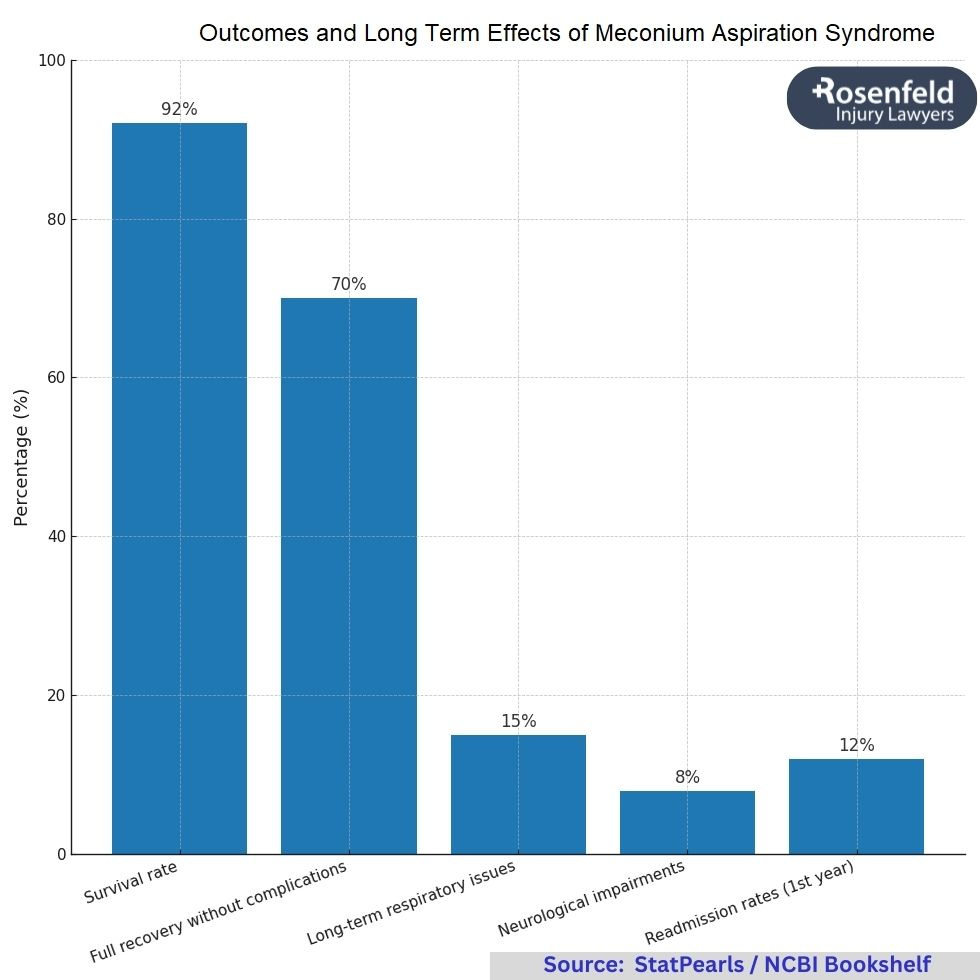Award-Winning Chicago Personal Injury Lawyer - Securing Justice
for Illinois Injury Victims - Over $450 Million Recovered
At Rosenfeld Injury Lawyers, our Chicago meconium aspiration syndrome attorney team represents families across Illinois whose children suffered preventable birth injuries due to medical negligence. We have extensive experience handling birth injury lawsuits where improper monitoring, delayed intervention, or mismanaged fetal distress led to meconium aspiration and severe complications.
Our legal team works to hold healthcare providers accountable, recover compensation for medical expenses and long-term care, and ensure that every child’s future needs are met through skilled legal advocacy and a commitment to justice.

Our birth injury law firm in Chicago has decades of experience successfully representing Illinois families in complex birth injury cases, securing substantial settlements and verdicts for children harmed by medical negligence during the labor and delivery process.
Our top-rated Chicago meconium aspiration syndrome lawyers have recovered hundreds of millions of dollars for Illinois families in birth injury lawsuits. Recognized by Super Lawyers and the Million Dollar Advocates Forum, we bring proven results, deep legal knowledge, and access to leading expert witnesses.
We have successfully handled cases involving meconium aspiration, fetal distress, and other preventable birth injuries, securing the financial compensation families need for medical care, therapy, and future expenses while holding negligent healthcare providers accountable.

Meconium aspiration syndrome (MAS) occurs when a newborn inhales a mixture of meconium (the baby’s first bowel movement) and amniotic fluid during or before delivery. This inhalation can block the baby’s airways, reducing oxygen flow and causing lung inflammation or infection.
Severe MAS may collapse a baby’s lungs, lead to severe respiratory distress, and even necessitate the use of a breathing tube. Prompt diagnosis and treatment are essential to prevent lasting complications, including potential brain damage from oxygen deprivation.
Meconium aspiration syndrome can result from several preventable factors:
Meconium aspiration syndrome is diagnosed through a combination of fetal monitoring, clinical observation, and medical imaging. During labor and delivery, fetal heart monitoring can reveal distress, prompting medical professionals to check for meconium-stained amniotic fluid. At delivery, the presence of fecal matter stained amniotic fluid may indicate that the baby has passed meconium.
Immediate suctioning of the newborn’s airway is critical to prevent inhalation. If aspiration has occurred, treatment may include oxygen therapy, mechanical ventilation, or, in severe cases, extracorporeal membrane oxygenation (ECMO) to support breathing. Prompt diagnosis and intervention are vital to prevent long-term respiratory issues and potential brain damage.
Meconium aspiration syndrome can have serious long-term effects. Chronic lung disease and persistent pulmonary hypertension may develop, making breathing more difficult throughout childhood. Being deprived of oxygen at birth can lead to hypoxic-ischemic encephalopathy, a type of brain injury that may cause cerebral palsy or other motor impairments.
Some children face an increased risk of developmental delays, learning disabilities, or ongoing respiratory problems, requiring long-term medical care, therapy, and educational support to address the lasting impact of the condition.
In a meconium aspiration syndrome birth injury lawsuit, families can seek compensation for a range of economic and non-economic damages. Economic damages may include hospital and NICU bills, the cost of respiratory support or oxygen therapy, ongoing medical care, medications, and physical or occupational therapy. Non-economic damages compensate for pain and suffering, emotional distress, and loss of a normal life due to the child’s injury.
In severe cases, families may also recover future damages for lifelong respiratory treatment, special education services, and diminished earning capacity. A skilled Chicago medical malpractice lawyer can work with medical experts to assess both immediate and long-term needs to pursue maximum compensation.
Based on Law.com’s VerdictSearch, payouts in meconium aspiration syndrome cases range from $227,500 to $120,654,000, with a median award of $9,806,337 and an average award of $27,332,362.
The value of these cases depends on several key factors:

$20.5M Verdict – Delayed Delivery and Pitocin Use Lead to Severe Birth Injuries
Cody White suffered severe perinatal asphyxia, meconium aspiration, CP, cortical blindness, and intellectual disability after delays in delivery and inappropriate Pitocin administration despite fetal distress. Plaintiffs argued the OB-GYN and hospital staff failed to act promptly and used an induction that worsened his oxygen deprivation. A jury found the defendants negligent, awarding $20.5 million for lifelong care, lost earnings, and pain and suffering.
$10M Verdict – Failure to Address Fetal Distress Causes Infant Death
Ella-Marie Jo Dickerson died hours after birth from perinatal asphyxia, meconium aspiration syndrome, and unrelieved cord compression. Plaintiffs alleged that the nurse and midwife failed to discontinue oxytocin, prepare for an emergency C-section, or deliver her promptly despite ongoing distress. The jury found negligence and awarded $10,002,200 for wrongful death, funeral expenses, and loss of services.
$9.6M Verdict – Delayed C-Section Results in Permanent Disability
Michael Stetson sustained meconium aspiration syndrome, CP, spastic quadriplegia, cortical blindness, and inability to speak after alleged failures to diagnose placental insufficiency and respond to fetal distress. Plaintiffs argued the delay in performing a C-section caused preventable harm. The jury found the primary OB-GYN negligent, awarding $9,610,475 (reduced to $6,246,808.75 for liability apportionment) for medical costs, lost earning capacity, and pain and suffering.
Proving malpractice in a birth injury case, including those involving meconium aspiration syndrome, requires more than showing a poor outcome. You must demonstrate that medical professionals failed to provide proper care and that this negligence directly caused the injury. This process demands expert testimony from obstetricians, neonatologists, and other specialists who can interpret fetal monitoring strips, delivery notes, and medical records.
A Chicago birth injury lawyer will gather and analyze this evidence, work with qualified medical experts, and build a compelling case to hold healthcare providers accountable, helping families recover compensation for medical expenses, long-term care, and emotional distress.
According to a study published in the National Library of Medicine, Meconium aspiration syndrome occurs in about 28.7% of newborns exposed to meconium-stained amniotic fluid. Key risk factors include thick meconium, which increases the risk more than 30-fold and is linked to 65% of MAS-related NICU admissions and is present in all recorded MAS-related deaths.

MAS birth injuries can occur in any Chicago hospital or delivery center where meconium-stained amniotic fluid is not properly managed during labor and delivery. Cases we have reviewed involve major facilities such as Northwestern Memorial Hospital and its Prentice Women’s Hospital, Rush University Medical Center, University of Chicago Medical Center, Advocate Illinois Masonic Medical Center, and Ann & Robert H. Lurie Children’s Hospital of Chicago. While these institutions have advanced resources and skilled medical professionals, errors such as delayed C-sections, improper suctioning, or failure to recognize fetal distress can still occur, leading to meconium aspiration syndrome and potentially lifelong complications for the child.
735 ILCS 5/2‑622 requires plaintiffs in medical malpractice cases, including meconium aspiration syndrome claims, to file a certificate of merit from a qualified healthcare professional. This document must confirm that the case has a reasonable basis, ensuring claims are supported by credible medical evidence before proceeding in court.
In LeBron v. Gottlieb Memorial Hospital (2010), the Illinois Supreme Court struck down the 2005 cap on non-economic damages in medical malpractice cases. The court, citing Best v. Taylor Machine Works, held the cap unconstitutional because it violated the separation of powers by restricting judicial authority to determine fair compensation.
Under 735 ILCS 5/13-212, most Illinois medical malpractice claims, including those involving meconium aspiration syndrome, must be filed within two years of when the injury was discovered or should have been discovered, but no later than four years after the malpractice.
In Chicago meconium aspiration syndrome (MAS) birth injury claims, liability may rest with multiple parties. OB-GYNs can be held responsible for failing to recognize fetal distress or delaying necessary interventions, such as a C-section. Labor and delivery nurses may be liable for not following fetal monitoring protocols or failing to clear the newborn’s airway. Hospitals can face liability for inadequate staffing, training, or enforcement of neonatal care protocols. Each plays a critical role in preventing MAS-related injuries and complications.
In meconium aspiration syndrome (MAS) cases, defense teams often argue that the injury was unavoidable due to factors outside the control of medical staff, such as pre-existing maternal health issues or the baby’s condition before delivery. They may also claim that even with timely intervention, the outcome would have been the same.
Our law firm counters these arguments with testimony from leading medical experts, detailed analysis of fetal monitoring strips, and a review of NICU records. By showing how earlier action or proper airway management could have prevented or reduced harm, we build a strong case for full and fair compensation.
To strengthen a meconium aspiration syndrome case in Chicago, act quickly to secure all relevant medical records, including fetal monitoring strips, delivery notes, and NICU charts. An independent review by a neonatology expert can help confirm whether medical negligence contributed to the child’s injuries.
Families should also maintain detailed documentation of the child’s ongoing medical issues, treatments, and therapy needs. This evidence is essential for proving the extent of harm and calculating fair compensation for current and future medical bills.
Our Chicago birth injury attorneys have the experience and resources to guide families through every stage of a meconium aspiration syndrome claim. We handle all aspects of the malpractice case, from filing the initial complaint to managing the legal process and court deadlines. Our team works with leading neonatal and respiratory care experts to identify errors, prove causation, and document the full extent of the injuries.
Whether through strategic settlement negotiations or presenting a compelling case at trial, we pursue maximum financial recovery to cover medical expenses, therapy, and long-term care, ensuring your child receives the support they deserve.
Yes. Severe meconium aspiration syndrome can block airways and reduce oxygen supply, leading to hypoxic-ischemic encephalopathy (HIE) or other brain injuries.
Treatment depends on severity. Mild cases may require only supplemental oxygen, while severe cases can involve suctioning, mechanical ventilation, or extracorporeal membrane oxygenation (ECMO). Prompt intervention by trained neonatal staff is critical to prevent complications like pulmonary hypertension, chronic lung disease, or brain injury from oxygen deprivation.
Our Chicago birth injury lawyers work on a contingency fee basis. You pay no upfront fees, and we only receive payment if we successfully recover compensation.
The timeline varies. Many MAS birth injury lawsuits take one to three years, depending on the complexity of the medical evidence, the number of defendants, and whether the case settles or proceeds to trial. More complex cases involving severe injury or wrongful death may take longer.

If your child suffered meconium aspiration syndrome and you believe medical negligence played a role, Rosenfeld Injury Lawyers is here to help. Our Chicago personal injury lawyers represent families across Illinois, providing skilled legal advocacy and compassionate support. We serve clients statewide, working to secure the financial recovery your child deserves for medical care, therapy, and future needs.
Call us at (888) 424–5757 or fill out our contact form to schedule a free consultation.
All content undergoes thorough legal review by experienced attorneys, including Jonathan Rosenfeld. With 25 years of experience in personal injury law and over 100 years of combined legal expertise within our team, we ensure that every article is legally accurate, compliant, and reflects current legal standards.